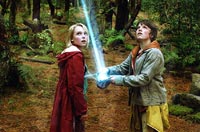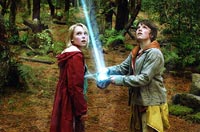Katherine Paterson once planned to be a missionary. She was born to missionary parents in China, and she spent four years in Japan as a missionary herself. But after returning to the United States to continue her education—and after meeting and marrying a young Presbyterian minister—she gave all that up. And then she became a writer.
Some of her earliest novels—like Sign of the Chrysanthemum, Of Nightingales that Weep and The Master Puppeteer—reflected her love of Japanese culture. And some of her non-fiction books—like Who Am I?, Images of God and Consider the Lilies: Plants of the Bible, the latter two written with her husband John—have reflected her own religious background.

But the book for which she is probably best known is Bridge to Terabithia, a story about two children—a girl named Leslie and a boy named Jess—who create an imaginary kingdom for themselves in a secret grove. It won the Newbery Medal in 1977 and has now been turned into a theatrical movie by Walden Media, the company behind The Chronicles of Narnia.
Paterson spoke to us about the book, the film, and the meaning of “story” in a phone interview shortly before the movie’s release this Friday. (Warning: This interview addresses story elements that will be spoilers to anyone who has not read the book or seen the film.)
Bridge to Terabithia was filmed for TV in the 1980s, but this is the first time it has been adapted for the big screen. Did you envision a movie coming out of this book at all?
Katherine Paterson: No. In fact, I thought it was such a private sort of book, that my editor probably wouldn’t even want to publish it; and if he wanted to publish it, I thought nobody would read it; and if they read it, nobody would understand it. I was shocked to realize that teachers were reading it out loud in school. It just seemed like a very, very private, personal story. The Wonderworks version for TV wasn’t awful, but it was very condensed, because of the time. I felt it’s a story of friendship, and there was not enough time [in the Wonderworks version] for the friendship to develop before the death occurs. You didn’t have enough time to really care about the child.
How involved have you been with the new film?
Paterson: I actually haven’t been all that involved, because I gave the rights to my son David. It was actually his friendship and the death of his best friend when he was eight that caused me to write the book in the first place. So when he asked me several years ago if he could do a screenplay and try to market it, I told him yes. Not only because he’s my son, but because he’s a very good playwright.
It took him many years, and by the time he got it sold, his original screenplay had been sent to a highly paid Hollywood writer who changed the story considerably. So he’s been really fighting for the integrity of the story for a very long time, not only because it grew out of his own story, but because I was his mother and I entrusted this to him, and because, as he said, he wanted to honor his friend who died. And I think they’ve made a good film.
Could you talk a bit about the process of writing the book?
Paterson: I was trying to make peace with [a tragedy that befell one of our friends]. When David was in second grade, he was best friends with a little girl named Lisa Hill, and that summer she was struck and killed by lightning. It was just a terrible experience, for him and for our whole family. At the same time, I was operated on for cancer, and he thought I was going to die. And I was trying to make sense of a tragedy that made no sense.
How does your Christian background inform the story?
Paterson: I think C. S. Lewis said somewhere that the book cannot be what the writer is not, and I think who you are informs what you write, on a very deep level. You reveal yourself whether you intend to or not. So you don’t put in stuff to signal that you’re a Christian; you write the story as well and as truthfully as you can because that’s how you glorify God, and you have to be true to the characters and who they are and how they talk. If it comes from a person who has a Christian hope and a Christian knowledge of grace, then I think hope and grace are going to infuse my work—not that I put them in, but because I can’t help having them there.

In the book, Leslie knows Narnia and lends the Narnia books to Jess, and yet she seems unaware of the Christian elements there. Because when she goes to church and hears the story of Christ, it is completely new to her?
Paterson: Right. (laughs) That happens all the time with kids who’ve read Narnia who have no Christian background whatsoever. I actually had a friend who loved all the books and then felt betrayed when people told her it had Christian associations. And she didn’t want it to be there, because she didn’t believe that stuff. She said, “I loved the books until somebody ruined it for me!” Whereas for Leslie, it helps her to appreciate the story of Jesus.
So one could argue that your book is in some way more explicitly Christian, because it brings the Easter story directly into it?
Paterson: Well, I’m not going to argue that, because, I mean, I am a Christian, and as I say, I think who I am comes into the book. But I have certainly not tried to write a Christian pamphlet.
When the children play in Terabithia, they pray to the spirits there. As a Christian writing those scenes, how did you approach that?
Paterson: Leslie, who has no Christian background, has made this up; she thinks there is something very mystical in the grove, so she prays to the spirits of the grove. And when she tries to get Jesse to do this, the only kind of language he knows is biblical language. He’s read the Bible, so his language comes out like biblical language, and hers comes out like fairy-tale language. But again, it’s coming from the children’s point of view, not from the point of view of me trying to [spell out] my religion.
Terabithia and Gilly Hopkins were on the American Library Association’s list of the most frequently challenged books of the 1990s?
Paterson: Yeah, well. (laughs) People say, “Aren’t you proud,” and I say, “No, because it means every time it’s challenged, some teacher or librarian is in trouble because of me, and I can’t enjoy that.” But the sad thing is, I think it’s because people don’t understand what a story is.
What is a story?
Paterson: A story is open-ended. A story invites you into it to make your own meaning. If you look at Jesus’ parables, I think the Parable of the Sower is about the only one in which his disciples demand that the meaning be spelled out, but most of the stories Jesus tells are very open-ended. I mean, even with the Parable of the Prodigal Son, you get to the ending and you think, Well, did the big brother come in or not? Jesus leaves it open deliberately, for you to answer that. And that’s what a story does. It’s inviting you to identify yourself as a part of a story, and to come into it from where you are—and if you hear the same story over a period of years, you’ll be in a different place, and the meaning is going to be different.
There’s a trend lately to provide books and films for Christian audiences that are “safe for the whole family.” Perhaps your books have been challenged because they’re not necessarily “safe” for children. What do you make of the idea that children’s books should be “safe”?
Paterson: Well, don’t give them the Bible, then, because it’s certainly not a safe book. Safety and faith are different things. If you want everything to be safe, then you can probably just totally do without the imagination. If you’re so afraid of your imagination that you stifle it, how are you going to know God? How can you imagine heaven?
Why is it important to deal with death in a story made for children?
Paterson: It’s sort of a practice [before we deal with death in real life]. Some people say, “Well, my child’s friend died, so I gave him a copy of Bridge to Terabithia,” and my internal reaction is, “You know, it’s too late.” I think books give us emotional practice.
We do have trouble dealing with death, but it’s the one thing that is guaranteed we are all going to have to do, and we are going to have to face it many times before we die ourselves.
One of the first things I heard about the Terabithia movie was that it was going to be a “sprawling fantasy adventure,” and they had hired a big special effects team for it, and my initial reaction was to sort of recoil at this&mdash?
Paterson: Your initial reaction? (laughs) What do you think mine was?
I don’t know, you tell me?
Paterson: Well, that was the thing I was most afraid of. And if you’ve seen the trailer, my word. I’m just telling everybody I know, “Don’t see the trailer, don’t see the trailer.” Because it’s exactly what the trailer ends up making you think, is that it’s this glorified fantasy adventure with nothing but special effects, and that’s not what we ended up with in this movie.

We’ve ended up with a movie about a friendship between a boy and a girl who develop an imaginary kingdom, and the girl dies, and the boy has to deal with his loss, which is the story of the book. Now of course, because it is currently 2007 and not 1977, when you make a certain type of movie, people expect special effects—and so they’ve got some special effects. But I don’t think they’ve ruined the movie. (laughs)
The one good thing that they managed to convey to me—and I can’t guarantee that this will be conveyed to everyone who sees it—was that Terabithia is not another land, that Terabithia is absolutely coming out of the children’s imaginations. It leads into the Terabithian scenes in such a way that I was convinced that they were creating this other land, which to me was masterful.
Do you think this movie might stifle the imagination, or replace it, or perhaps be a stimulus to the imagination in some other way?
Paterson: I wish I could answer that question. Of course I hope it will stimulate the imagination. I’m not sure that a movie can ever do that as well as a book, simply because you have a big picture right there in front of you, that you’re not allowed to make for yourself.
Looking around at children’s literature today, what’s your impression? Any particular books or writers that you like?
Paterson: There are a lot of books I like, some wonderful writers, and I always hesitate to give names because I have so many friends in the business, and they say, “Why didn’t you name me?” (laughs) There are some writers I really like, and I just think there’s such fine writing going on right now. There’s a lot of schlock, too, and publishers say, “Well, we have to publish the schlock so we can have enough money to publish the good things,” but schlock tends to crowd the good things off the shelf, so I’m not too happy with that.
Is there more schlock now than there used to be?
Paterson: Oh yeah. Lots more schlock! (laughs)
Can you name any names there, or do you also have friends writing the schlock?
Paterson: (laughs) I’m not naming names anywhere! They know who they are!
Copyright © 2007 Christianity Today. Click for reprint information.











